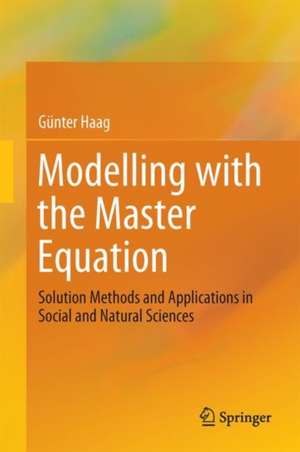Modelling with the Master Equation: Solution Methods and Applications in Social and Natural Sciences
Autor Günter Haagen Limba Engleză Hardback – 9 aug 2017
Part I of the book, which can be used as a toolbox, introduces selected statistical fundamentals and solution methods for the Master equation. In Part II and Part III, the Master equation approach is applied to important applications in the natural and social sciences.
The case studies presented mainly hail from the social sciences, including urban and regional dynamics, population dynamics, dynamic decision theory, opinion formation and traffic dynamics; however, some applications from physics and chemistry are treated as well, underlining the interdisciplinary modelling potential of the Master equation approach.
Drawing upon the author’s extensive teaching and research experience and consulting work, the book offers a valuable guide for researchers, graduate students and professionals alike.
| Toate formatele și edițiile | Preț | Express |
|---|---|---|
| Paperback (1) | 700.42 lei 6-8 săpt. | |
| Springer International Publishing – 12 mai 2018 | 700.42 lei 6-8 săpt. | |
| Hardback (1) | 706.81 lei 6-8 săpt. | |
| Springer International Publishing – 9 aug 2017 | 706.81 lei 6-8 săpt. |
Preț: 706.81 lei
Preț vechi: 831.54 lei
-15% Nou
Puncte Express: 1060
Preț estimativ în valută:
135.24€ • 141.21$ • 111.93£
135.24€ • 141.21$ • 111.93£
Carte tipărită la comandă
Livrare economică 05-19 aprilie
Preluare comenzi: 021 569.72.76
Specificații
ISBN-13: 9783319602998
ISBN-10: 3319602993
Pagini: 385
Ilustrații: XXV, 342 p. 109 illus., 19 illus. in color.
Dimensiuni: 155 x 235 mm
Greutate: 0.69 kg
Ediția:1st ed. 2017
Editura: Springer International Publishing
Colecția Springer
Locul publicării:Cham, Switzerland
ISBN-10: 3319602993
Pagini: 385
Ilustrații: XXV, 342 p. 109 illus., 19 illus. in color.
Dimensiuni: 155 x 235 mm
Greutate: 0.69 kg
Ediția:1st ed. 2017
Editura: Springer International Publishing
Colecția Springer
Locul publicării:Cham, Switzerland
Cuprins
Preface.- 1 Introduction.- 2 Statistical Fundamentals.- 3 Derivation of the Chapman-Kolmogorov Equation and the Master Equation.- 4 Solution Methods of Master Equations.- 5 Some Applications in Physics and Chemistry.- 6 The Master Equation in Dynamic Decision Theory.- 7 Applications in Population Dynamics.- 8 Migration.- 9 Urban Dynamics and Transport.
Notă biografică
Guenter Haag studied engineering and physics at the University of Stuttgart and earned his Ph. D in Physics in 1978. He was visiting professor at the Case Western Reserve University, Cleveland in 1982 and the Institute for Advanced Studies (IHS), Vienna in 1990. At that time he was also member of the working groups Long waves in economy and Metropolitan studies at the International Institute for Applied Systems Analysis (IIASA), Laxenburg. The appointment to a university lectureship came in 1985 and in 1995 he was appointed APL professor for Theoretical Physics at the University of Stuttgart. In 1993 he became in addition managing director of the Institute for Applied Economic Research, Tuebingen. Two years later he founded the Steinbeis Transfer Center Applied Systems Analysis in Stuttgart, and in 2003 the STASA GmbH. He is member of different international working groups and member in the editorial board of international journals. He has initiated and led several national and international projects in the field of system analysis, statistics, urban and regional development and transport theory. Robert-Mayer-Award, do-it Software-Award 2004, Löhn-Award 2011.
Textul de pe ultima copertă
This book presents the theory and practical applications of the Master equation approach, which provides a powerful general framework for model building in a variety of disciplines. The aim of the book is to not only highlight different mathematical solution methods, but also reveal their potential by means of practical examples.
Part I of the book, which can be used as a toolbox, introduces selected statistical fundamentals and solution methods for the Master equation. In Part II and Part III, the Master equation approach is applied to important applications in the natural and social sciences.
The case studies presented mainly hail from the social sciences, including urban and regional dynamics, population dynamics, dynamic decision theory, opinion formation and traffic dynamics; however, some applications from physics and chemistry are treated as well, underlining the interdisciplinary modelling potential of the Master equation approach.
Drawingupon the author’s extensive teaching and research experience and consulting work, the book offers a valuable guide for researchers, graduate students and professionals alike.
The case studies presented mainly hail from the social sciences, including urban and regional dynamics, population dynamics, dynamic decision theory, opinion formation and traffic dynamics; however, some applications from physics and chemistry are treated as well, underlining the interdisciplinary modelling potential of the Master equation approach.
Drawingupon the author’s extensive teaching and research experience and consulting work, the book offers a valuable guide for researchers, graduate students and professionals alike.
Caracteristici
Offers self-contained introduction to the mathematical and statistical fundamentals of the Master equation and a toolbox for further applications Explains the modelling potential of the Master equation in detail by means of many examples from different disciplines Documents and discusses all relevant mathematical steps, helping the reader to apply the method quickly
